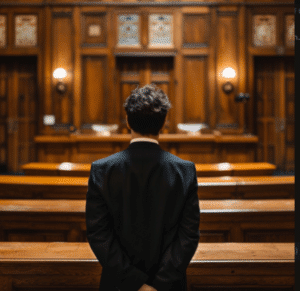Gross Negligence vs Recklessness: Unpacking the Critical Differences and Their Impact
Last updated Monday, November 18th, 2024

In the fine line that separates accountability in legal scenarios, understanding the distinction between “gross negligence vs recklessness” is crucial. Simple recklessness might involve a lapse of attention, while gross negligence is characterized by a blatant indifference to safety. This article shines a light on the nuances that differentiate the two, their legal implications, and how they can alter the stakes in personal injury claims.
Key Takeaways
- recklessness involves a breach of duty that a reasonable person would perform under similar circumstances, which may result in unintentional harm, whereas gross negligence displays a willful disregard for the safety of others, potentially resulting in more serious harm or injury.
- The legal consequences for gross negligence are typically more severe than for recklessness, with the possibility of punitive damages aimed at punishing the wrongdoer in addition to compensatory damages for the victim.
- In personal injury claims, proving recklessness requires establishing duty of care, breach, causation, and damages, with gross negligence requiring evidence of a greater level of recklessness or indifference towards the safety of others.

Get Your FREE Case Review,
In Person or Virtually Online
Understanding Recklessness and Gross Negligence
Recklessness comes into play when an individual fails to exhibit the level of care and caution that would be expected from an ordinary person in similar circumstances. It is a breach of the expected standard of care. It is, in essence, a breach of a fundamental responsibility, which has the potential to cause harm to people or property. For instance, if a driver neglects to stop at a red light and causes an accident, they could be considered negligent. Even if the harm was unintentional, there can be legal liability if there was injury due to this inattention or carelessness.
However, gross negligence takes this concept a step further. This form of negligence is more severe, showing a reckless disregard for the safety of others. Here, we are dealing with actions that fall significantly below what is considered reasonable or acceptable. It’s not just about a momentary lapse in judgment or a careless mistake; gross negligence involves actions that display a reckless or deliberate disregard for the safety, life, or rights of others. Examples of gross negligence include:
- Driving under the influence of alcohol or drugs
- Ignoring safety protocols in a workplace
- Failing to properly maintain equipment or machinery
- Intentionally causing harm to someone
- Repeatedly engaging in dangerous behavior despite knowing the risks
These examples demonstrate the extreme nature of gross negligence and the serious consequences it can have, sometimes even bordering on criminal negligence. In fact, such cases often involve ignoring fundamental responsibility.
Recklessness
Recklessness occurs when an individual’s actions fall short of the care that a reasonably prudent person would have shown in similar circumstances, which may cause harm. This failure to exercise reasonable care is often unintentional but characterizes recklessness. For instance, if a store owner knows about a spill on the floor but neglects to clean it up promptly, and a customer slips and falls, the owner could be held liable for recklessness.
In such a scenario, the harm caused by recklessness must generally be to the body or property. However, in some jurisdictions, emotional distress or mental anguish could also be a form of recognizable harm. The key here is that the individual’s actions (or lack thereof) failed to meet the standard of what would be expected from a reasonable person in the same situation.
Gross Negligence
Conversely, gross negligence represents a heightened level of negligence, distinguished by a willful disregard for others’ safety, potentially resulting in substantial harm. This severe form of negligence suggests an action that falls significantly below the reasonable standard of care, and may sometimes imply an intentional harm. For instance, a doctor performing a surgery while intoxicated could be a case of gross negligence due to the massive risk this action poses to the patient’s safety.
The gross negligence actions are substantially more egregious than ordinary negligence, often leading to a higher degree of harm and consequently, the potential for greater damages. It’s important to remember though, that while gross negligence can result in substantial harm, it does not necessarily involve intentional conduct.

Get Your FREE Case Review,
In Person or Virtually Online
Legal Implications of Recklessness and Gross Negligence
There are varying legal implications for recklessness and gross negligence, especially in terms of liability and damages. In gross negligence cases, penalties can include:
- Special damages for specific losses incurred by the victim
- General damages for non-economic losses like pain and suffering
- Punitive damages which are intended to punish the wrongdoer and deter similar future behavior.
While the information regarding penalties and damages in recklessness cases is limited, it’s clear that gross negligence, due to its severity, carries with it heavier penalties. This difference in penalties underscores the need for careful distinction between recklessness and gross negligence in legal discussions.
Liability in Recklessness Cases
In cases of recklessness, the defendant bears legal responsibility due to their lack of reasonable care, resulting in harm or injury to others. In such cases, a legal document called a liability waiver can sometimes protect the defendant from lawsuits. This waiver, often signed before engaging in certain activities, can insulate the defendant from lawsuits over injuries resulting from their recklessness.
However, the enforceability of these waivers is subject to the specifics of the document itself, including its language and scope. Courts will consider these factors to determine whether it can effectively protect the defendant from liability for recklessness.
Liability in Gross Negligence Cases
However, gross negligence carries with it more severe implications. Gross negligence is recognized as a more severe form of recklessness that reflects a greater departure from the conduct expected of a reasonable person compared to recklessness. It often results in increased liability and the potential for more severe legal consequences.
The differentiation between gross negligence and recklessness is crucial in determining damages, where gross negligence can lead to awards that include punitive damages. In assessing gross negligence, courts examine the presence of reckless disregard for the safety of others, and proving gross negligence requires a demonstration of conduct that is significantly more egregious than recklessness.
Impact on Personal Injury Claims
Both recklessness and gross negligence can have a profound effect on personal injury claims. Gross negligence, due to its severity, can facilitate the process for the injured party to receive necessary compensation in a personal injury case. Once liability for gross negligence is established, plaintiffs are entitled to compensation for their losses.
The type of recklessness involved can influence the compensation awarded. For instance, a claim involving gross negligence may result in a higher compensation award due to the severity of the defendant’s actions and the harm caused. Conversely, a claim involving recklessness may result in a lower compensation award as it usually involves less severe actions and harms.
Compensation in Recklessness Claims
In recklessness cases, compensatory damages aim to reimburse the plaintiff for losses attributable to the defendant’s lack of reasonable care. Plaintiffs can claim compensation for various types of losses including:
- Medical expenses
- Lost wages
- Property loss
- Pain and suffering
- Instances of wrongful death
To successfully claim compensatory damages, plaintiffs must provide documentation of their injuries and financial losses. This could include medical bills, proof of lost wages, and evidence of other financial losses related to the injury. The aim is to restore the injured party to the position they were in before the injury occurred.
Compensation in Gross Negligence Claims
Claims involving gross negligence can potentially lead to substantially higher compensation. In addition to compensatory damages, punitive damages may also be awarded in gross negligence cases. These are not designed to compensate the victim but rather to punish the wrongdoer and deter similar future behavior.
The presence of gross negligence in a personal injury case can greatly strengthen the plaintiff’s position, resulting in higher compensatory awards and the eligibility for punitive damages. The recklessness or extreme indifference to the safety of others displayed in gross negligence cases often leads to severe injuries, which in turn, justifies the award of higher compensation.
Real-life Examples of Recklessness and Gross Negligence
To further understand the difference between negligence, specifically recklessness and gross negligence, we can look at some real-world examples. By understanding the difference, we can see that recklessness and gross negligence both involve actions (or lack thereof) that fail to meet a certain standard of care, leading to harm to people or property. However, the level of conduct and the resulting harm can greatly vary.
For instance, recklessness could be a driver failing to signal before changing lanes, causing a minor fender-bender. On the other hand, gross negligence might involve a surgeon operating while under the influence of alcohol, putting the patient’s life at significant risk.
Recklessness Examples
Recklessness refers to situations where an individual does not demonstrate the level of care that a reasonably prudent individual would in similar situations. For instance, a driver who is texting while driving and causes a collision could be considered ordinarily negligent. Similarly, if a store owner fails to put up a wet floor sign after mopping and a customer slips and falls, this could also be a case of recklessness.
Another example could be a property owner who neglects to repair or replace wood-rotted stairs, resulting in someone falling and getting injured. In all these cases, the individuals failed to take the reasonable precautions that were expected of them, leading to accidents and injuries.
Gross Negligence Examples
Conversely, gross negligence pertains to scenarios showing a pronounced degree of recklessness or indifference towards others’ safety and wellbeing. An extreme example could be a healthcare professional prescribing medication to a patient, knowing that the patient is allergic to that medication. In this case, the healthcare professional’s actions display a gross disregard for the patient’s safety.
Similarly, an intoxicated driver causing a major accident could also be a case of gross negligence, as could a nursing home staff failing to provide necessary sustenance to residents for an extended period. These actions display a reckless disregard for the safety and well-being of others, going far beyond what would be considered recklessness.

Get Your FREE Case Review,
In Person or Virtually Online
How to Prove Recklessness and Gross Negligence
Establishing negligence, be it recklessness or gross, forms a critical part of any personal injury claim. It involves proving negligence by demonstrating four key elements:
- Duty of care
- Breach
- Causation
- Damages
This process often requires extensive evidence and expert testimony to clarify the appropriate standard of care and identify how the defendant’s actions deviated from that standard.
In cases involving either recklessness or gross negligence, the onus of proof is on the plaintiff. They must provide clear and convincing evidence to prove that the defendant’s actions (or lack thereof) amounted to recklessness or gross negligence.
Proving Recklessness
In order to establish ordinary recklessness, it should be shown that the defendant owed a legal duty of care to the plaintiff, breached this duty, which in turn caused harm to the plaintiff, and consequently, the plaintiff incurred damages. For example, if a driver runs a red light and causes a collision, it can be argued that they had a duty of care to follow traffic rules, that they breached this duty by running the red light, that this breach caused the collision, and that the other party suffered damages as a result of the collision.
The burden of taking precautions to prevent harm, the likelihood of harm occurring, and the potential severity of harm are all considered when determining a breach of duty of care. The harm must be a foreseeable result of the breach (proximate cause) and would not have happened but for the defendant’s actions (cause-in-fact).
Finally, it must be established that the injury resulted in damages which were a direct consequence of the at-fault party’s breach of duty.
Proving Gross Negligence
On the other hand, to prove gross negligence, it necessitates evidence showcasing an extreme indifference or reckless disregard for others’ safety. This means that the plaintiff must provide evidence that the at-fault party’s actions were:
- willful
- wanton
- malicious
- exhibiting extreme indifference to the safety and health of others.
The threshold for proving gross negligence is high, requiring a demonstration of conduct that is significantly more egregious than recklessness. For instance, a surgeon operating under the influence of alcohol would be an example of gross negligence due to the significant risk this action poses to the patient’s safety. In such a case, the plaintiff would need to provide compelling evidence of the surgeon’s reckless and dangerous behavior.
The Role of a Personal Injury Attorney
Personal injury attorneys hold a vital role in handling cases that involve recklessness or gross negligence, including personal injury lawsuit cases. They handle a diverse array of incidents where individuals have suffered harm due to negligence, such as vehicle accidents, medical malpractice, and slip-and-fall accidents. These attorneys guide clients on various options and support them throughout the intricate process of pursuing a personal injury claim to trial.
Regardless of whether your claim involves recklessness or gross negligence, it is always advisable to seek guidance from a seasoned personal injury attorney. They can leverage their knowledge to navigate complex legal frameworks, devise strategies, and advocate for your cause effectively.
Evaluating Your Case
Upon consulting a personal injury attorney, the initial step they undertake is to assess your case. This involves determining if recklessness or gross negligence was involved and assessing the merits of your case. Personal injury lawyers conduct thorough investigations and identify liable parties to assess the merits of a case.
Consulting with an attorney is important to navigate the litigation process and understand the potential outcome of the claim. They play a crucial role in consulting with experts to establish the recklessness of the defendant, thus impacting the strategy and direction of the case.
Navigating the Legal Process
After your case evaluation and the filing of a claim, your personal injury attorney will navigate you through the legal journey. This includes collecting and organizing evidence, interviewing witnesses, and even representing you during mediation. The discovery phase, where attorneys exchange critical information such as testimonies, evidence, and documents, is a key part of this process.
If a case goes to trial, the attorney prepares for all phases including:
- Jury selection
- Opening statements
- Witness examination
- Cross-examination
This is done to best represent the client’s interests. Whether you’re dealing with recklessness or gross negligence, having an experienced personal injury attorney or a personal injury lawyer by your side can make a significant difference in the outcome of your case.
Frequently Asked Questions
What is the main difference between recklessness and gross negligence?
The main difference between recklessness and gross negligence is the level of care involved. Recklessness is a failure to exercise reasonable care, while gross negligence shows a reckless disregard for others’ safety.
How does gross negligence impact a personal injury claim?
Gross negligence can make it easier for the injured party to receive compensation in a personal injury case, as plaintiffs are entitled to compensation for their losses once liability for gross negligence is established.
How can one prove recklessness?
To prove recklessness, you need to show that the defendant had a duty of care, breached this duty, caused harm to the plaintiff, and resulted in damages for the plaintiff.
What is the role of a personal injury attorney in a negligence case?
The role of a personal injury attorney in a negligence case is to guide clients through the legal process, provide advice on their options, and represent them in court, playing a pivotal role in these cases.
What can be considered as gross negligence?
Gross negligence can be considered as a higher degree of recklessness or indifference to the safety and health of others. For example, a healthcare professional prescribing medication to a patient despite knowing the patient is allergic to it.



